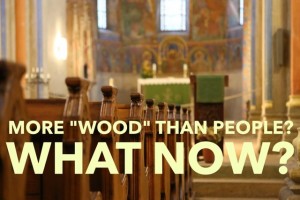Those who have been worshipping irregularly have stopped worshipping at all.
The spots where they sat three times a month, then two times a month, then once a month and then only occasionally are now empty and showing only wood.
And those spots are starting to grow. It’s not just the Beckers who go south for the winter or the Schneiders who like to visit their grandkids in Michigan. It’s also not just those who have died or the young people who are looking for a church with more children. Many are no longer attending. That is the reality. There is more wood than people! What happened? What now?
The answer isn’t to jump into a solution like trying a new worship style, thinking it will work. Many churches have erroneously thought the answer was instituting contemporary worship. Hobble together a praise band, or even scrape together enough money to pay someone to play the piano or guitar and lead the singing. Usually it is a weak attempt that doesn't attract anyone new (or bring anyone back) and it often only upsets the faithful attenders. That’s not the reason and that’s not the solution.
It is easy to shoot from the hip and blame and point and accuse and say the answer is X or Y. If it were that easy you would have done it a long time ago. But now you find yourself waking up from the challenge called denial. Time to go to the doctor.
Your doctor would be sued if they shot from the hip and diagnosed your problem without doing at least one more test than was necessary. They’d be in worse trouble if they started prescribing treatments and medicines without a diagnosis! In the same way, shouldn’t we in the church be even more wise and carefully think through what has been and is going on before deciding what needs to be done? The stakes are not just life but eternity. So when there’s more wood than people, what should you do? First do your homework:
- Examine the data: Worship attendance trends, baptisms, giving, new members, loss of members, transfers out, etc. Hopefully you have these kinds of records so you can look back and examine the facts. Compare the data to the history of the congregation and what do you find? The challenge is looking at them without your bias as a church member. It is easy to make excuses and explain things away, even cold hard facts.
- Ask, “Who are we as a church?” Are you a Christian church as the body of Christ or are you a religious club? Sometimes a church can drift from proclaiming the truth of the gospel and forget Jesus Christ. So what do you believe, teach and confess? Jesus Christ as Savior of all? Law and Gospel preaching or the 5 ways you can be a happier person or some equally non-biblical message meant not to offend but be practical self help? Assuming the gospel and drifting from the gospel of Jesus is easily done. It is also easy to become so inwardly focussed that the church fails to be the “salt and light” of Jesus to those around it so that the activities narrow down to what church “club” members want for themselves. This is mission drift at the extreme.
- Ask “Who is really gone and why?” Take the time to compile the names and addresses of former members and attenders. What really happened? Why are they gone? It may be a simple move or death but often it is a difficult lesson that needs to be learned. Take the time to visit and interview them. This is not the time to try to talk them into coming back. This is not the time to argue with them. You are there to humbly ask and then listen intently. Love them. Cry with them. Repent and face the reality of what they say. It will no doubt be difficult to hear but often insightful. Their perception is their reality. What can you learn from that? What can it teach you about what is really going on?
- How do you really engage people outside the church? Look over five or ten years of activities from your church calendar. What do you find? Are there activities or programs where you expected people to come to you from the outside? How did that work? If you were not intentional, probably not very well. If some did come, did you nurture those relationships afterward? Probably not very well. What does that teach you? Did you do things for people far away, even overseas? Great! That helps your people learn servanthood. How did that translate locally? What have you done to nurture relationships with your neighbors in the community surrounding the church? If that list comes up thin then you simply have become isolated from other people and it helps to explain why few new people are coming. Repentance is often necessary here too.
This is hard work. It is sobering and it is a real challenge to learn why you find yourself looking at more wood than people. The natural reaction to bad news is to deny it or make excuses. Yet this diagnostic stage must be done. Swallow hard and ask God for His help. Only then can you truly see the need and find the motivation as a church to make the needed changes with conviction and intentionality.
Scott Gress is called by Lutheran Counseling Services and partners with the FL-GA District of the Lutheran Church as an independent contractor. He specializes in Leadership Training, Consulting, Coaching and Coach Training. Contact Scott to continue the conversation or experience a free sample coaching session. 561-542-4472, scottgress@me.com or scottgress.com
Sign up to be notified of blog updates

